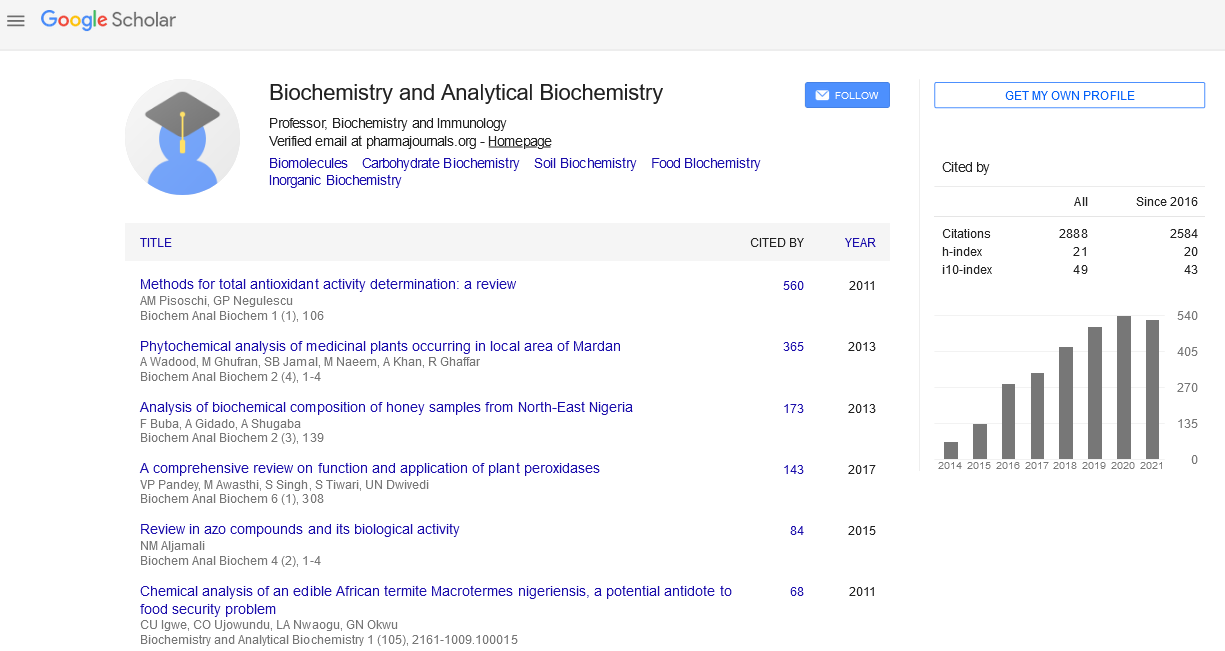Indexed In
- Open J Gate
- Genamics JournalSeek
- ResearchBible
- RefSeek
- Directory of Research Journal Indexing (DRJI)
- Hamdard University
- EBSCO A-Z
- OCLC- WorldCat
- Scholarsteer
- Publons
- MIAR
- Euro Pub
- Google Scholar
Useful Links
Share This Page
Journal Flyer

Open Access Journals
- Agri and Aquaculture
- Biochemistry
- Bioinformatics & Systems Biology
- Business & Management
- Chemistry
- Clinical Sciences
- Engineering
- Food & Nutrition
- General Science
- Genetics & Molecular Biology
- Immunology & Microbiology
- Medical Sciences
- Neuroscience & Psychology
- Nursing & Health Care
- Pharmaceutical Sciences
Computational functional and structural annotation of hypothetical proteins of Neisseria Meningitidis MC58
International Conference on Biochemistry
October 10-12, 2016 Kuala Lumpur, Malaysia
Suresh Kumar
Management & Science University, Malaysia
Scientific Tracks Abstracts: Biochem Anal Biochem
Abstract:
Neisseria meningitidis is a parasitic gram-negative bacterium best known for its role in meningitis and other forms of meningococcal disease such as meningococcemia. It is important to identify possible novel drug targets and to thrive serogroup B vaccines against the potential pathogen because one of Neisseria meningitidis�??s strains, MC58, has natural transformation capacity. Because of the emergence of new drug resistant strains, even though several generic drugs and vaccines have been developed over time, Neisseria meningitidis infections remain a global health problem that appeals for the development of novel drugs and vaccines against the pathogen. In the complete genome of Neisseria meningitidis strain MC58, there are 2158 coding genes out of which 681 encodes for hypothetical proteins (HPs). With the help of various bioinformatics tools, the extensive functional analysis of these HPs was performed. We have analyzed 681 hypothetical proteins using various functional prediction tools like CDART, Interproscan, SMART, Interpro, CATH and pfam. Among 682 total hypothetical proteins, we successfully annotated 436 proteins present in Neisseria meningitidis genome. It was observed that out of 436 proteins, 13 proteins are enzymes, 26 proteins are transporters, 11 are assembly proteins, 6 proteins involve in cell division, 70 proteins are binding proteins, 15 proteins are integral membrane proteins, 6 proteins are catalytic domains, 15 proteins are factors, 24 proteins regulators, 3 are structural proteins, 3 are ion channels, 42 are RNA proteins, 111 proteins sequences contain a domain of unknown function (DUF), remaining proteins cannot be functionally determined by any of the tools. These analyses suggest a possible role of hypothetical proteins in the survival, development and pathogenesis of the organism. Further we have identified 38 hypothetical proteins as virulence causing factors using VICMpred tool. Virulence causing proteins can serve as potent drug targets for the drug discovery process. The outcomes of this comprehensive study will be useful for better understanding of pathogenesis, drug resistance, adaptability to host, epidemic causes and drug discovery for treatment of the disease.
Biography :
Suresh Kumar is Senior Lecturer in bioinformatics at Management and Science University, Malaysia. He previously worked as Senior Lecturer at National University of Malaysia, Malaysia. He has obtained his PhD from the University of Vienna, Vienna, Austria. He did his post-doctoral work at Texas State University, USA. He has six years of experience in teaching and research. His research interests include structural bioinformatics, sequence analysis, Next-generation sequence data analysis.
Email: sureshkumar@ukm.edu.my


